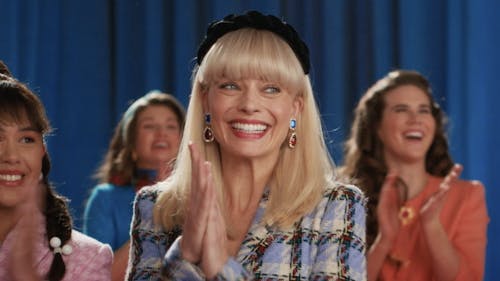What 'Barbie' gets wrong about patriarchy

Let me preface this piece by saying that I, at the very least, enjoyed many aspects of Greta Gerwig's 2023 summer blockbuster "Barbie."
The film's strengths are apparent right from the film's opening scene — featuring young girls from a past era, a la "2001: A Space Odyssey," worshipping a giant Margot Robbie. Helen Mirren narrates the Mattel icon's importance in establishing dolls' independence from their then-universal maternal association.
The film is at its best when it's weird, off-beat and different. But it begins to falter when it comes to many of the larger points its director attempted to make using its ultra-marketable characters.
For all it gets right, "Barbie" presents an insultingly superficial view of the complex issue that is the patriarchy. This is made all the more bizarre by just how prominently the topic features in the film's plot, leading to what you would assume to be a deep comprehension of it by Gerwig and her team — a presumed level of understanding that does not come across in the final product.
By using the obvious analogies of the Barbies and Kens to their real-life biological sexes and gender identities, the patriarchy is a force that constantly benefits all men equally. Not only is this an incredibly reductive way to frame the problem, but it's also simply inaccurate.
In an article published by the International Psychoanalytical Association, author Naomi Snider does an excellent job at painting a more concrete image of what the patriarchy is, describing it as "a set of cultural rules and values that specify how men and women should be and act."
Where I feel Snider's article does a better job portraying an accurate depiction of the patriarchy than "Barbie" is in the section titled "Patriarchy is different for different people," where she mentions how the patriarchy has affected not just herself, but her clients.
She starts by listing her own experiences, saying, "Patriarchy is the ways I have whittled down my sharp edges in the attempt to become one of those prized women — valued in the eyes of the world — yet a stranger to myself. It encompasses the years I spent trying to hide and transform my body, getting rid of its soft parts and making myself smaller so I could feel bigger."
This, to me, is the closest description to match Gerwig's depiction of the patriarchy. Stereotypical Barbie's quest is quite literally centered around her attempts to fit the unrealistic beauty standards set upon her by her creators, as she begins to gain more real-life qualities, such as cellulite and flattened feet.
But Snider's own experiences with the patriarchy are not the only ones listed in her article. On top of outlining the additional racial discrimination faced by her client Rachel as an African-American woman, she explains the challenges with which her client Mark is burdened with being a gay man in a corporate leadership role.
From her article, she says "For Mark, a gay patient with a high-powered job in media, patriarchy is the pressure to seem like a 'guy's guy.' It is not having cried since he was 12."
The reality of the situation is that the patriarchy hurts anybody who deviates from its gender rules and values as outlined above. There are some more radicalized sects of the feminist movement who may attempt to label misandry as activism.
But as this article from the International Association of Students in Economic and Commercial Sciences points out, feminism can be defined as "a range of political movements, ideologies, and social movements that share a common goal: to define, establish, and achieve political, economic, personal, and social equality of sexes," while misandry is "the hatred of, contempt for, or prejudice against men or boys."
This is before even mentioning issues like how the broad statement of "the patriarchy benefits all men" presents to transgender individuals. Given how fluid the concept of gender identity is, the argument that any individual who identifies as male is treated favorably in a patriarchal society (while eschewing such essential context such as their sex assigned at birth, or overall gender presentation) is laughable at best, and damaging at worst.
Most frustrating of all is the completely missed opportunity from the "Barbie" team by not utilizing its characters to make the most of its social commentary.
I don't know about you, but when I think of "men benefitted by the patriarchy," my mind immediately shifts toward the stereotypical scene featuring a company boardroom dominated by older, stoic, heterosexual white men.
Apparently, I was not alone in this assumption, as a not insignificant portion of "Barbie" centers around Mattel's nameless CEO (Will Ferrell) attempting to return Stereotypical Barbie to Barbieland, but his role in the story starts and ends with this goal.
Save for a throwaway joke about Barbie's confusion regarding the lack of women in Mattel's leadership, no efforts are made to seriously tie Ferrell's character to patriarchy.
Again, I feel I must emphasize that there is still plenty to enjoy about "Barbie," but it feels like for a story so focused on delivering hard-hitting social commentary, much of what it wants to say feels ultimately murky and confused.



